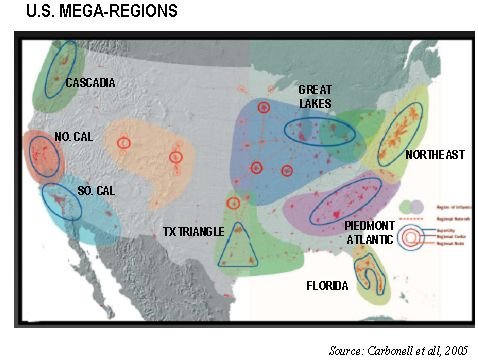haha
Give me a museum and I'll fill it. (Picasso) Give me a forum ...
http://www.nytimes.com/2011/11/26/opinion/the-death-of-the-fringe-suburb.html
I have not been to enough cities recently to have any idea if this thesis, that demand is falling and values will fall in outer suburbs, while city core and inner ring suburbs will flourish and become more urban is generally correct. It seems to be correct in MetroSeattle.
Doing this in an intelligent way will likely require smart zoning, rapid transit, and a good working relationship between enlightened developers and local and national government. It will also require a loosening of the 1950s mandate that gasoline taxes and car tags revenues etc. be mostly spent on highways.
A giant shift is taking place toward the South Lake Union District. Maybe 15 years ago this was known only as the Denny Regrade. Paul Allen bought a lot of land there, and now almost every week another large high-end employer announces that it is moving there, or at least moving a big portion of ops there. Amazon, Google, even Microsoft have made big investments here. And housing is following. This is also where Whole Foods built its central city location.
Here is a short excerpt from an MS blogger about doing a stint in South Lake Union:
"For those just joining me, let's get up to speed here: I'm on assignment this week, working from Microsoft's South Lake Union office in Seattle. I'm being all jealous because the teams here are totally hiring, but I love my job in Redmond.
Yesterday I wrote about my amazing 10 minute non-520 in-city commute (!!!) and today I'm sniffing around the building to get a feel for what the space is like."
Recently we had a ballot issue regarding rapid transit across the I90 floating bridge between Seattle and Bellevue, WA. One big developer named Kemper Freeman wants to block a transit corridor across the Lake. Microsoft and other major Eastside employers want this rapid transit, to make their employees' commutes easier, and generally to ease the flow between both sides of Lake Washington. Freeman lost. There is no immediate plan to Link Transit to go east, as there are unfinished high priority extensions planned, and some funded, already. But it will happen.
Ha
I have not been to enough cities recently to have any idea if this thesis, that demand is falling and values will fall in outer suburbs, while city core and inner ring suburbs will flourish and become more urban is generally correct. It seems to be correct in MetroSeattle.
Doing this in an intelligent way will likely require smart zoning, rapid transit, and a good working relationship between enlightened developers and local and national government. It will also require a loosening of the 1950s mandate that gasoline taxes and car tags revenues etc. be mostly spent on highways.
A giant shift is taking place toward the South Lake Union District. Maybe 15 years ago this was known only as the Denny Regrade. Paul Allen bought a lot of land there, and now almost every week another large high-end employer announces that it is moving there, or at least moving a big portion of ops there. Amazon, Google, even Microsoft have made big investments here. And housing is following. This is also where Whole Foods built its central city location.
Here is a short excerpt from an MS blogger about doing a stint in South Lake Union:
"For those just joining me, let's get up to speed here: I'm on assignment this week, working from Microsoft's South Lake Union office in Seattle. I'm being all jealous because the teams here are totally hiring, but I love my job in Redmond.
Yesterday I wrote about my amazing 10 minute non-520 in-city commute (!!!) and today I'm sniffing around the building to get a feel for what the space is like."
Recently we had a ballot issue regarding rapid transit across the I90 floating bridge between Seattle and Bellevue, WA. One big developer named Kemper Freeman wants to block a transit corridor across the Lake. Microsoft and other major Eastside employers want this rapid transit, to make their employees' commutes easier, and generally to ease the flow between both sides of Lake Washington. Freeman lost. There is no immediate plan to Link Transit to go east, as there are unfinished high priority extensions planned, and some funded, already. But it will happen.
Ha
Last edited:


